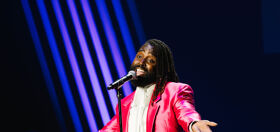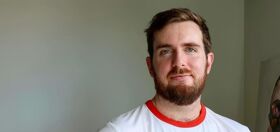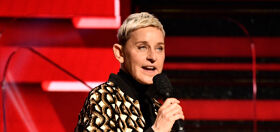
Many gay folk pride themselves on being able to judge whether someone else is gay. However, a study has poured cold water on this idea, saying both straight and gay participants were pretty similar when it came to guessing the sexuality of others when it comes to their voice.
The study appeared in the Journal of Homosexuality. The author was Fabio Fasoli from the University of Surrey in England.
He took around 130 participants and played audio recordings of other people. He then asked them to say whether they thought the speakers were gay or heterosexual.
In a second study, rather than a binary “gay/straight” choice, he asked participants to rate speakers on a Kinsey-like scale.
The study explored audio clues to sexuality, not how people dress or present themselves visually.
Fasoli noted that some gay people may talk in a more uninhibited, natural way with their gay friends. They may then adapt their manner of speech around gay people. Has this led to us being able to better pick up on queer cues via speech?
It seems not.
The study found both straight and gay participants were more likely to categorize speakers as straight. In fact, they labeled so many of the speakers as straight that they both tended to miss the gay speakers.
Secondly, both groups were slightly better at identifying gay women than gay men.
Gay participants were slightly more likely to identify speakers as gay, but not necessarily accurately. The researchers suggest that gay people might be less inhibited in labeling other people as gay, whereas straight people might be more cautious of doing so, given the stigma that is often still attached to being queer.
However, “Our findings support overall auditory gaydar inaccuracy, even when LGB participants were involved,” said Fasoli.
“Second, we did not find any support for the idea that gaydar is an ‘innate’ or ‘adaptive’ skill that only LGB individuals have. Instead, we found that LGB participants were less ‘rigid’ in their sexual orientation categorization and more likely to categorize speakers as gay as shown by their weaker straight categorization bias.”
Discrimination against people who sound gay
Fasoli says the research is important because those judged to have a “gay voice” often face discrimination.
Related:
No femmes: Gay guys prefer “masc” men in leadership roles at work, alarming study finds
A new study says people equate “flamboyant” as ditzier or less competent.
A recent study in Sydney found that both gay and straight people were more likely to judge a straight-sounding man as more competent and professional. The study looked at men in higher-status job roles. It found participants judged traditionally masculine men as more suitable candidates for high-profile positions.
Fasoli concluded, “Overall, both LGB and heterosexual individuals appear to be quite inaccurate in their gaydar judgments,” when based just on voices.
Related:
Let’s hear it for this “gay voice” appreciation post
“I know many queer men are sensitive about their voices, so I want to inject some positivity into the discourse.”






















Brian
…but they didn’t really test the premise. Most people do not say “gaydar” to mean anonymous phone conversations. It’s a combination of sound, look, style, attitude, energy — whole personality. Their conclusion just can’t be applied to 99% of the situations in which people use the word.
KyleMichelSullivan
Gaydar is about more than just the voice. It’s subtle mannerisms and expressions and appearance and a whole host of other details. I’ve been able to tell when someone’s gay before they even speak. Limiting it to this one factor is questionable, at best.
Donston
Many queer males purposely deepen their voices or just have naturally deep voices. So, that alone isn’t all that telling. Having good “gaydar” means being able to pick up on voice tone, inflections, mannerisms, body stances, facial expressions, and- if you have a thorough back and forth with someone- their habits, their interests, if they’re trying too hard to come off “manly”, if you can sense some masculine insecurities. It definitely goes beyond a basic phone conversation.
Of course, it’s not a science. And it’s impossible to tell the dimensions of someone’s sexuality, lifestyle, what identities they embrace, where they are in the gender, sexual, affection, romantic, emotion, commitment spectrum. But you can often at least pick up if someone has queer dimensions.
PubisHairus
All Gen Z kids sound queer to me, so I think my gaydar now only works on relics.
It’s like having 3G in a 5G world.
inbama
Raising kids without gender is bearing fruit.
Literally.
Troyfight
@PubisHairus ….. yes, i noticed the same thing (gen z males)
Stefano
Same here. Aren’t they supposed to be all fluid? Maybe that’s why…. ? I feel sorry for the poor heterosexual women who have to choose between all these effeminate guys…but on the other hand, they have no choice.
JJinAus
Voice has little to do with it. I’ve connected with men with their wives and children walking down the road. It’s in the eyes and the length and communication with just a few seconds of contact. Straight men don’t stare back.
Donston
Eh, that depends. If a guy is closeted and/or self-conscious he might not look back. I certainly tried my best not to look at a guy for any length of time when I was closeted and worried about being perceived as “gay”. He also may simply have no interests or attractions towards you in particular. Also, not having same-sex preferences or even interests doesn’t equate to being legit heterosexual and “straight”. Just like having a wife and some kids doesn’t equate to being heterosexual and “straight”. Or having a husband doesn’t equate to being inherently and conventionally heterosexual and “gay”.
“Gaydar” or “queer-dar” is a spectrum and has dimensions just like “sexuality”, preferences, lifestyle, the gender, sexual, affection, romantic, emotion, commitment spectrum. That’s why it’s important to, yes, pick up on “clues” but to also see people and their dimensions and motivations as individual.
henare
This is, pretty much, nothing. The sample size is far too small to be useful and gaydar has always been much more than vocal qualities. (Indeed, gaydar can do what it does because it depends on non- verbal communication).